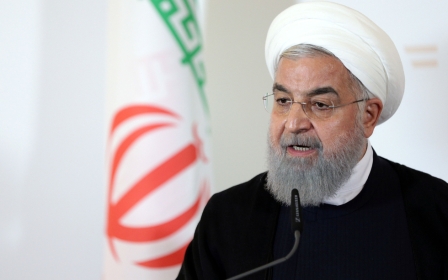Iran increasing its crackdown on student activists, says rights group

Iranian authorities have increased their crackdown on student protesters with prison terms and restrictions on their peaceful activities since protests that began in December last year, Human Rights Watch (HRW) has said.
The Intelligence Ministry has arrested at least 150 students with courts sentencing 17 others to prison, according to a member of parliament, the US-based rights group said on Saturday.
Sarah Leah Whitson, HRW's Middle East director, called on the Iranian authorities to encourage students to engage in "public discourse" instead of arresting them.
"Instead of enabling a safe environment for peaceful activism, Iranian authorities have gone back to their favorite response: cracking down on peaceful dissent," Whitson said in a statement.
"While encouraging students to participate in public discourse, the authorities in practice prosecute them for peaceful assembly."
These latest arrests took place after Iranian security officials repressed protests that broke out in December 2017 and January this year.
Another Iranian parliamentarian in January said that most arrests were "preventative" after following up on the students being rounded up by local authorities.
More than 20 people died in the protests, marking the biggest internal challenge to the government since the 2009 presidential election demonstrations.
In the December 2017 protests, students at Tehran Univeristy shouted anti-government slogans before being dispersed by riot police. Posters of Ali Khamenei, the supreme leader of Iran, were also torn down at the university.
HRW said that its sources had reported as of mid-July 2018 that revolutionary courts had sentenced at least eight student protesters from universities in Tehran and Tabriz to prison sentences of up to eight years.
The courts had also banned some of the students from being members of political parties and participating in media, including social media, for two years.
The Association of Union for University Students in Iran used its Telegram channel to report in March that Branch 26 of Tehran's revolutionary court had sentenced Leila Hassandzadeh and Sina Rabiee, student activists from the University of Tehran, to six years and one year in prison respectively.
This sentence included a two-year travel ban on charges of "conspiracy and collusion to act against national security" and "propaganda against the state".
The association also reported that on 5 March a trial court had sentenced Mohsen Haghshenas, a student of scenic design at the University of Tehran, to two years in prison on charges of "conspiracy and collusion to act against national security" and "disruption of public order by participating in illegal assemblies".
'Propaganda against the state'
On 10 July, Roya Saghiri, a student at the University of Tabriz, posted on her Instagram account that a court of appeal had upheld her 23-month prison sentence "for propaganda against the state and insulting its pillars," HRW reported.
Several days earlier, a court had sentenced two University of Tabriz students, Ali Kamrani and Ali Ghadiri, to six months in prison.
In an earlier case, Fereshteh Tousi, 30, was sentenced by a Tehran court to 18 months in prison on 3 July on charges of "propaganda against the state" for organising a ceremony commemorating the national student day at the Allameh Tababa'i University in December 2016.
Mahmoud Sadeghi, a parliament member from Tehran, tweeted on 28 June that courts reportedly based their verdicts and sentences against student activists on reports and interrogations by intelligence ministry officials.
Mansour Gholami, the science minister, told the Iranian Students News Agency on 18 July that a committee in the ministry is negotiating with authorities for leniency in the sentencing of these students.
Since March, 125 university professors and dozens of student associations have called on President Hassan Rouhani to intervene to protect the students' rights, HRW said.
"President Hassan Rouhani, who ran [for office] under the promise of citizens' rights, should direct the ministries under his supervision to halt these abuses against university students," Whitson said.
"These are the young people who are so often extolled as essential to the country's future economic success."
Stay informed with MEE's newsletters
Sign up to get the latest alerts, insights and analysis, starting with Turkey Unpacked
Middle East Eye delivers independent and unrivalled coverage and analysis of the Middle East, North Africa and beyond. To learn more about republishing this content and the associated fees, please fill out this form. More about MEE can be found here.




